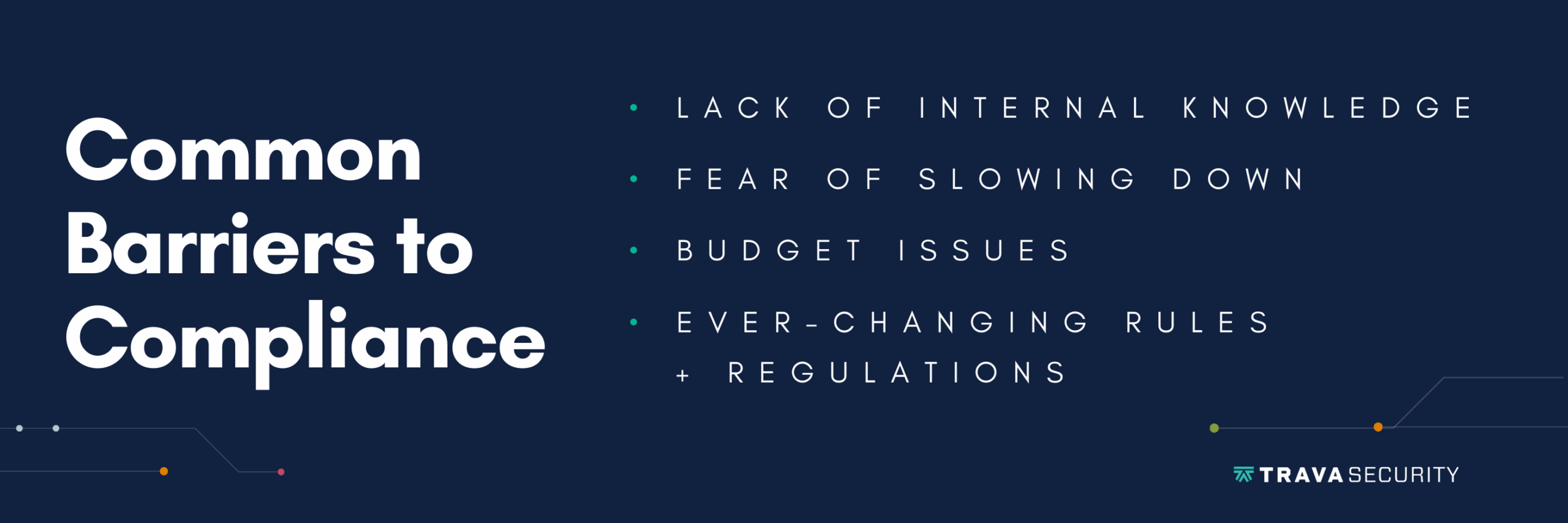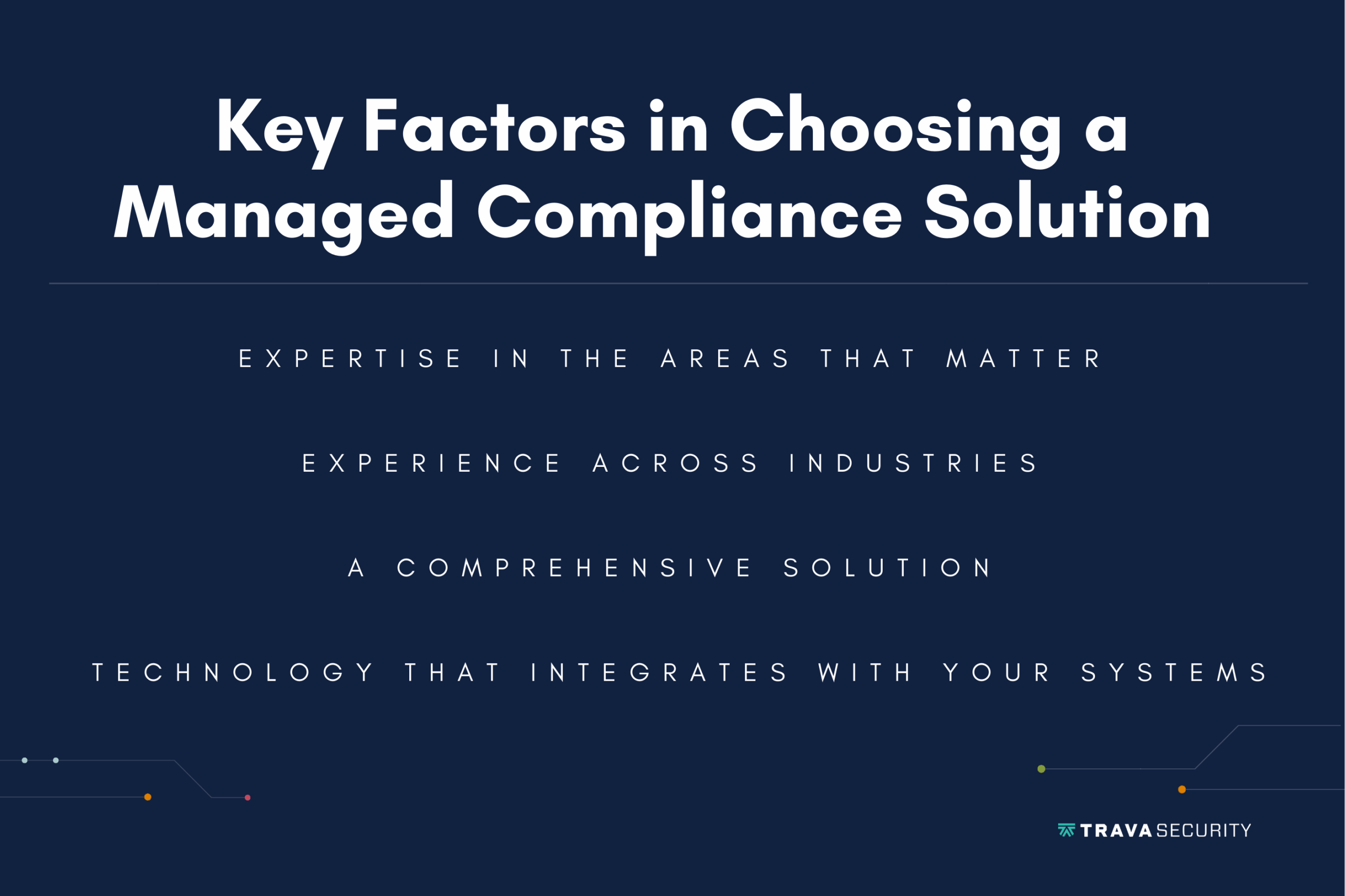Last updated: Septemeber 19, 2025
Table of Contents
- What is compliance management?
- How do organizations navigate key cybersecurity and compliance frameworks?
- What are the key benefits of compliance frameworks?
- What Is Compliance as a Service?
- What is compliance monitoring?
- How does Compliance as a Service differ from traditional consulting?
- Can managed compliance services reduce business barriers?
- What are the benefits of outsourcing compliance?
- Which providers offer comprehensive Compliance as a Service for small companies?
- How can Compliance as a Service provider help your business?
- How can managed compliance services make a difference?
- FAQ
Key Takeaways
- Compliance as a Service (CaaS) simplifies regulatory management: A managed compliance service helps businesses meet cybersecurity, data privacy, and AI security standards efficiently.
- Compliance programs provide a strategic advantage: Beyond avoiding risk, a structured compliance approach builds trust with customers and partners.
- Key frameworks guide compliance efforts: SOC 2, ISO 27001, GDPR, CCPA, HIPAA, and emerging AI frameworks like ISO 42001 and NIST AI ensure organizations meet industry standards.
- Managed compliance services reduces internal barriers: Outsourcing compliance monitoring, audits, and remediation frees internal teams to focus on growth.
- Proactive compliance monitoring is critical: Ongoing oversight ensures your organization stays audit-ready and continuously meets regulatory requirements.
While only 7% of companies today believe they are leading the way in compliance, nearly 40% intend to do so in the near future.¹ That’s where Compliance as a Service (CaaS), also known as managed compliance, comes in.
CaaS is a structured compliance program that helps your business meet regulatory and industry standards across cybersecurity, data privacy, risk management, policy development, and audit readiness. With the right program, compliance becomes more than a requirement—it becomes a strategic advantage, reducing risks and strengthening organizational security. For SaaS companies, SaaS compliance often involves meeting frameworks like SOC 2, ISO 27001, and GDPR to satisfy customer requirements and stay competitive.
Learn how managed compliance services keep your business secure, ensure regulatory compliance, and free your team to focus on growth.
What is compliance management?
Compliance management is the ongoing process of ensuring your business meets regulatory, legal, and industry standards across all areas of operations. Often delivered as Compliance as a Service (CaaS) or managed compliance, it provides a structured compliance program that supports everything from data privacy and cybersecurity to risk management, policy development, and audit readiness.
With a compliance program, a team of experts helps your business stay current with industry regulations, prepares you for audits, and turns compliance from a potential liability into a strategic advantage. The program can also guide you in implementing and advancing security measures, ensuring your organization not only meets legal requirements but also strengthens its overall security posture.
For organizations leveraging modern technology, compliance management often involves adherence to cybersecurity compliance frameworks, data privacy compliance frameworks, and AI security compliance frameworks, such as SOC 2, ISO 27001, GDPR, ISO 42001, and NIST AI. This structured approach ensures businesses stay secure, maintain privacy, and are prepared for emerging regulatory and technological requirements.
While compliance and security often overlap, your organization’s security program will likely focus more on protecting your business from threats and cyberattacks. Compliance ensures that you meet every legal and regulatory requirement and mitigate a host of business risks. Compliance programs can also help you implement and advance security measures.
What are the key benefits of compliance frameworks?
Compliance frameworks provide more than just a checklist for legal and regulatory requirements. They deliver tangible benefits for your organization:
- Risk Reduction: Frameworks like ISO 27001, SOC 2, and HIPAA help identify and mitigate security, privacy, and operational risks before they become critical issues.
- Customer and Partner Trust: Meeting recognized standards demonstrates that your business takes security and privacy seriously, strengthening relationships and credibility.
- Operational Efficiency: Compliance frameworks establish repeatable processes, policies, and controls, making audits, reporting, and internal governance more streamlined and consistent.
- Regulatory Readiness: Staying aligned with frameworks like GDPR, CCPA, and CPRA ensures your organization is prepared for inspections, audits, and potential legal changes.
- Strategic Advantage: By integrating frameworks into your compliance program, you can turn regulatory requirements into a differentiator, positioning your organization as a trustworthy and forward-thinking business.
Using a managed compliance service or CaaS can help implement and maintain these frameworks efficiently, ensuring your organization realizes these benefits without overburdening internal teams.
What Is Compliance as a Service?
Compliance as a Service (CaaS) is a managed compliance solution that handles all aspects of your compliance program for you. CaaS ensures your business meets cybersecurity, data privacy, and regulatory standards while freeing your team to focus on growth.
Compliance as a Service has transitioned from a nice-to-have to a must-have for businesses of all sizes.
Services typically include:
- Compliance readiness for audits and audit facilitation
- Governance, risk, and compliance (GRC) management
- Custom compliance policies and procedures
- Risk assessments and testing
- Incident and business continuity management
- Vendor risk and vulnerability management
Whether you call it Managed Compliance or CaaS, the goal is the same: provide a full-service compliance solution with expert oversight, streamlined processes, and scalable results.
With compliance and cybersecurity designed for growth companies, Trava delivers comprehensive compliance services that support your business goals and strategies.
With the help of a managed compliance service, you can take your business to the next level, prevent serious cybersecurity issues, and help your organization become a true leader in compliance.
What is compliance monitoring?
Compliance monitoring is the ongoing process of tracking your organization’s adherence to relevant standards, frameworks, and regulations. For SaaS companies, it ensures that security, privacy, and operational controls are continuously maintained. Knowing how to monitor compliance effectively involves a mix of automated tools, regular audits, and expert oversight to identify gaps or risks before they become critical. With proactive compliance monitoring, businesses stay audit-ready, reduce the chance of violations, and turn compliance into a strategic advantage rather than just a requirement.
Managed compliance services can take this a step further by handling compliance monitoring and remediation on your behalf, freeing your team to focus on growth while staying fully compliant.
How does Compliance as a Service differ from traditional consulting?
While both Compliance as a Service (CaaS) and traditional compliance consulting aim to help organizations meet regulatory requirements, the delivery models and long-term value differ significantly.
Traditional consulting is often project-based. A consultant may step in to help with a single certification, conduct a one-time audit, or draft compliance policies. Once the project is complete, the responsibility for ongoing compliance monitoring, updates, and risk management usually falls back on the internal team. This approach can leave organizations scrambling when frameworks change or when an unexpected audit arises.
Compliance as a Service, on the other hand, is designed to be proactive and continuous. Instead of a one-off engagement, CaaS provides ongoing monitoring, automated tools, expert oversight, and tailored compliance management that evolves with your business. This subscription-style model ensures your organization is always audit-ready, frameworks stay up to date, and compliance becomes a built-in part of operations rather than a periodic fire drill.
In short: consulting helps you achieve compliance at a point in time, while CaaS helps you maintain compliance every day.
Great — here’s a comparison table that fits right after the section text:
CaaS vs. Traditional Compliance Consulting
| Aspect | Traditional Consulting | Compliance as a Service (CaaS) |
| Engagement model | One-time or project-based | Ongoing, subscription-based |
| Focus | Achieve compliance at a point in time | Maintain continuous compliance |
| Monitoring | Limited to project scope | Continuous monitoring and remediation |
| Scalability | Requires new engagements for new needs | Scales with business growth and evolving regulations |
| Responsibility | Internal team manages compliance after project ends | Shared responsibility with provider oversight |
| Audit readiness | May require additional prep before each audit | Always audit-ready |
| Value | Short-term fixes and guidance | Long-term strategic advantage |
Can managed compliance services reduce business barriers?
Managed compliance services help organizations overcome key barriers to certification—and often include tools like a compliance monitoring system to streamline the process.
Here are a few common barriers organizations face:
- Lack of internal knowledge: It is common to not have a compliance expert on staff, which is why many organizations turn to outsourced compliance services as a scalable solution. Knowledge is power (and essential) when it comes to compliance.
- Fear of slowing down: Whether you are worried about slowing the pace of production or engineering, it is a good idea to recognize that lack of compliance is a far bigger risk to your business. It can be easy to get buried in compliance paperwork and feel overwhelmed by all the boxes that need to be checked, but when you understand how to monitor compliance, you can alleviate this fear.
- Budget issues: While some organizations worry about the cost of becoming compliant, managed compliance services are often a more affordable and scalable solution than building an in-house program. Many businesses actually save money by hiring a compliance expert.
Let’s face it: Cybersecurity and data compliance today is complicated. There are rules and regulations. Advanced technology. Hoops to jump through. Many businesses know that they need a managed compliance solution, but simply don’t know where to begin.
Fortunately, there are solutions and options for all of these challenges. Outsourced compliance offers answers and support to barriers and challenges.

What are the benefits of outsourcing compliance?
Outsourced compliance services can help organizations that may lack the time or expertise to implement a robust compliance program.
Not only will outsourcing compliance save your business time, but managed compliance solutions also offer access to expert resources and makes it easier to scale when the time is right. It can also offer value, reduce risk, and make sure you are prepared for what’s to come.
Managed compliance services typically consists of the following services and more, depending on your particular business needs:
- Compliance readiness for audits, as well as audit facilitation
- Review of common compliance standards and regulations to determine which ones will best support your business
- Governance, risk, and compliance (GRC) prep and management
- Custom compliance policies and procedures for your organization
- Risk assessments and testing
- Incident and business continuity management
- Vendor risk and vulnerability management
- Premium external audit management
Depending on your organization’s needs, you can customize your compliance services so you get everything you need and nothing that you don’t. Any company that has compliance requirements can be a great fit for Compliance as a Service.
To put it simply, managed compliance and Compliance as a Service offers:
- Time savings and scalability
- Access to compliance experts
- Reduced risk and improved audit readiness
- Streamlined cybersecurity and data privacy practices
All of these managed compliance services are designed to help your business achieve the highest standards of data privacy and cybersecurity, a key benefit of outsourcing.

Which providers offer comprehensive Compliance as a Service for small companies?
Small and mid-sized businesses, especially SaaS companies, often face the greatest challenges in compliance. Limited budgets, smaller teams, and the pressure to meet customer security requirements can make it difficult to achieve certifications like SOC 2 or ISO 27001. Fortunately, several providers offer Compliance as a Service (CaaS) solutions tailored to smaller organizations.
Key qualities to look for in a provider include:
- Expertise across core frameworks like SOC 2, ISO 27001, HIPAA, GDPR, and emerging AI standards
- End-to-end services that cover monitoring, audits, risk assessments, and policy development
- Scalable programs that grow with your business needs
- Technology integration with your existing systems
- Ongoing education and support, not just one-time consulting
Trava Security stands out as a leading provider for small businesses and SaaS companies alike. Unlike traditional consulting firms that may focus on one-off engagements, Trava offers a comprehensive managed compliance program designed for scalability and affordability. With Trava, businesses gain:
- Expert guidance from compliance professionals with experience across industries
- Full-service compliance management, from framework selection to audit readiness
- Technology-driven monitoring and remediation to keep organizations audit-ready year-round
- Tailored support that meets the unique needs of smaller teams without overwhelming resources
- A 100% certification success rate, giving clients confidence that every engagement leads to successful outcomes
By partnering with Trava, SaaS companies and other growth-focused businesses can achieve the same level of compliance maturity as larger enterprises without the overhead of building an in-house compliance department.
📌 See it in action: Check out our Campfire Learning case study to learn how Trava helped this SaaS company achieve SOC 2 Type 2 certification in just six months with our Compliance as a Service program.
How can Compliance as a Service provider help your business?
If you have determined that your business would benefit from a compliance management system, you have already taken the first step toward top-notch compliance. The next step is to find the right CaaS provider for your organization. Choosing the right CaaS provider ensures you get a tailored solution that meets your business needs, integrates with your technology, and supports ongoing training and reporting.
What should you look for when it comes to outsourced compliance services? Keep the following in mind:
- Expertise in the areas that matter: It is critical to find a partner with expertise in frameworks such as SOC 2, ISO 27001, HIPAA, and any other frameworks that matter to your business. Make sure you take the time to discuss cybersecurity frameworks and ask for relevant examples when interviewing Compliance as a Service providers.
- Experience across industries: Likewise, your ideal CaaS provider will have experience working in multiple industries and should understand your specific sector’s challenges and needs. Ask for references and Compliance as a Service examples.
- A comprehensive solution: Ideally, your compliance provider will have a solution that encompasses Compliance as a Service, compliance readiness, data privacy consulting, strategic security leadership, and more. Your provider should also be able to customize your compliance services and scale with your business as needed.
- Technology that integrates with your current systems: To support ease of use and overall business compliance, your vendor’s tech should work seamlessly with your current systems. And it goes without saying that they should use the latest compliance management software.
Client satisfaction, training support and ongoing education for your team, cost-effectiveness, and reporting and analytics are also important attributes that every great CaaS provider should offer.
An outsourced compliance provider can help you save time and implement an expert compliance program, so it pays to take the time to find the right outsourced compliance provider for your business needs and goals.
How can managed compliance services make a difference?
A strong managed compliance provider will offer:
- Expertise in frameworks like SOC 2, ISO 27001, HIPAA, and others relevant to your business
- Experience across industries
- Technology that integrates with your systems
- Comprehensive support from compliance design to management
Trava Security’s managed compliance services are designed for growth companies interested in achieving and excelling in compliance. Whether you are new to CaaS or would like to upgrade or enhance your current offering, we can help.
Managed compliance services from Trava deliver a one-stop compliance solution, providing complete management to help you prepare for audits and manage business security risks. We can handle every step of your compliance journey from design to management so your team can stay focused on its core responsibilities.
As a trusted CaaS provider, Trava also shares expert guidance so you know that your compliance needs are always covered. Our CaaS offers full-service support, ensuring success with human expertise, credibility, and a 100% certification rate.
Outsourcing compliance management is an affordable and effective solution for small and mid-sized businesses that want to meet cybersecurity and regulatory needs without the cost and work of a full-time security team. Working with an expert can help you achieve and streamline compliance efforts and deliver thorough cybersecurity every time.
Reach out to Trava Security today for a consultation or to explore more about how you can start the process of outsourcing Compliance as a Service.
Sources
- Moving faster: Reinventing compliance to speed up, not trip up. (February 2025.) PwC.
FAQ
What are managed compliance services?
Managed compliance services are outsourced programs that help businesses meet regulatory, cybersecurity, and data privacy standards. They include monitoring, audits, risk management, and ongoing expert oversight.
How do managed compliance services work?
These services operate continuously, handling compliance tasks such as implementing frameworks, performing risk assessments, monitoring controls, and preparing your organization for audits.
Which compliance frameworks do managed compliance services cover?
Key frameworks include SOC 2, ISO 27001, GDPR, CCPA, HIPAA, ISO 27701, and emerging AI standards like ISO 42001 and the NIST AI framework.
Why should businesses use managed compliance services?
Outsourcing compliance reduces internal workload, ensures expert guidance, improves audit readiness, strengthens data security, and allows your team to focus on growth.
What are the main benefits of managed compliance services?
Managed compliance services help organizations:
-
Reduce cybersecurity and regulatory risks
-
Maintain audit readiness
-
Build trust with customers and partners
-
Streamline compliance processes
-
Free internal teams to focus on core business priorities
How do managed compliance services differ from traditional consulting?
Unlike one-time consulting projects, managed compliance services are continuous. They provide ongoing monitoring, proactive updates, and full oversight so your organization stays compliant every day.
Can managed compliance services help small and mid-sized businesses?
Yes. Managed compliance services are scalable and can be tailored to smaller teams, helping them achieve certifications and meet regulatory requirements without the overhead of an in-house compliance department.


